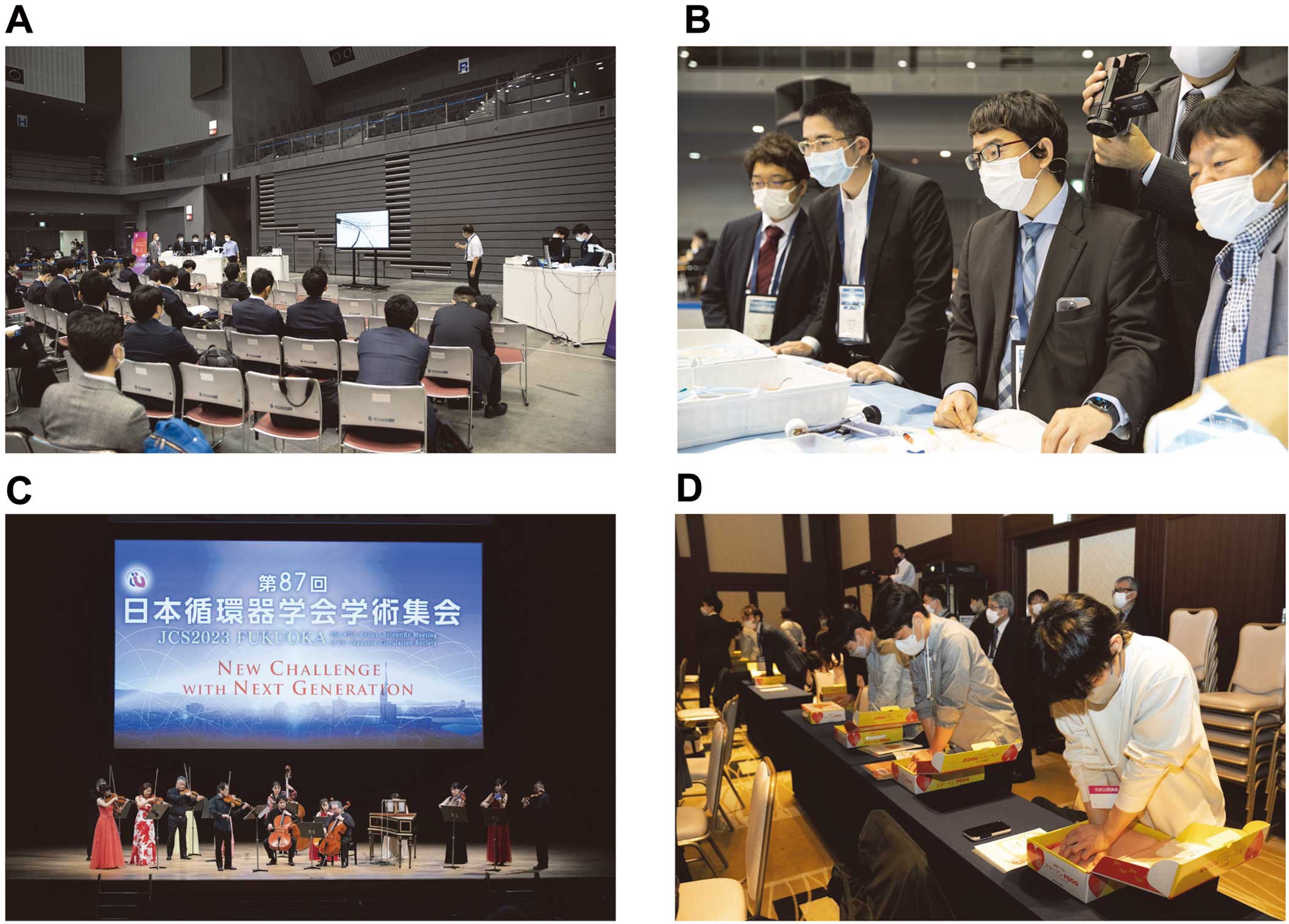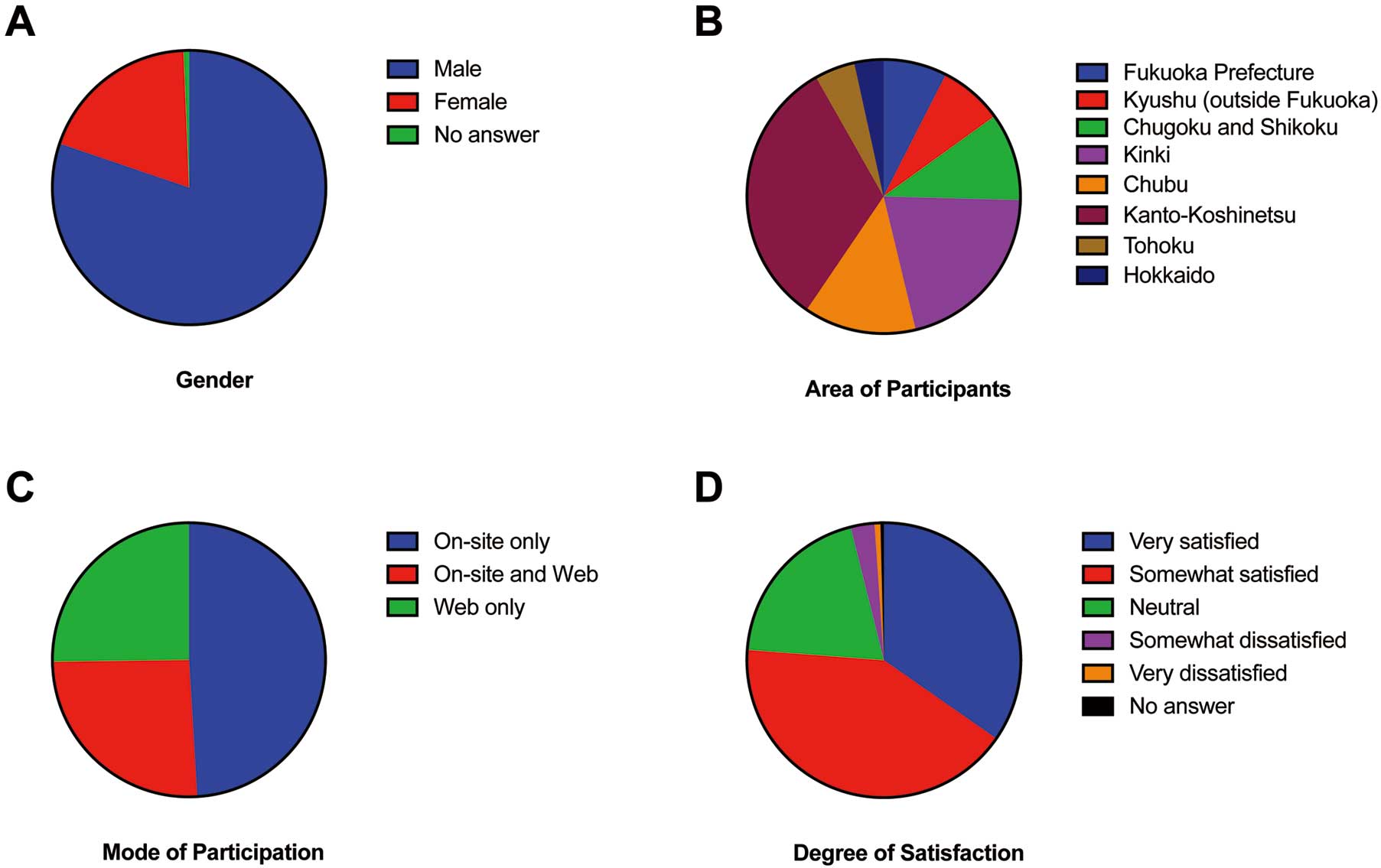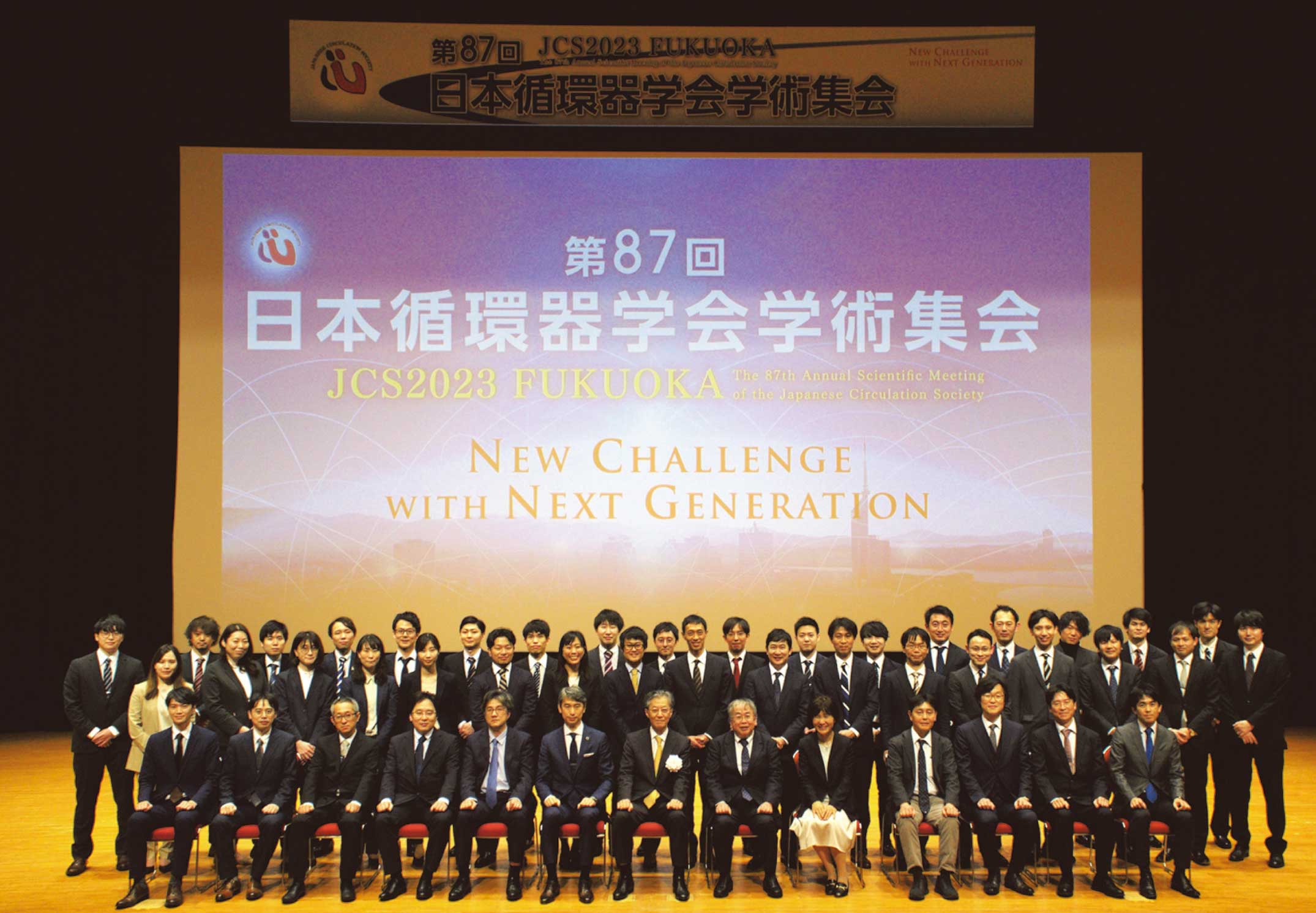Abstract
The 87th
Annual Meeting of the Japanese Circulation Society (JCS2023) was held in March 2023 in Fukuoka, Japan, marking the first in-person gathering after the COVID-19 pandemic. With the theme of “New Challenge With Next Generation” the conference emphasized the development of future cardiovascular leaders and technologies such as artificial intelligence (AI). Notable sessions included the Mikamo Lecture on heart failure and the Mashimo Lecture on AI in medicine. Various hands-on sessions and participatory events were well received, promoting learning and networking. Post-event surveys showed high satisfaction among participants, with positive feedback on face-to-face interactions and the overall experience. JCS2023, attended by 17,852 participants, concluded successfully, marking a significant milestone in post-pandemic meetings, and advancing cardiovascular medicine.
Overview and Meeting Theme
The 87th
Annual Meeting of the Japanese Circulation Society (JCS2023) was held in Fukuoka City, Japan, from March 10 (Friday) to 12 (Sunday), 2023, with Professor Hiroyuki Tsutsui (currently, Vice President of International University of Health and Welfare) of the Department of Cardiology, Graduate School of Medicine, Kyushu University, as the President. The meeting was held in Fukuoka International Congress Center, Fukuoka Sun Palace, and Marine Messe Fukuoka (Figure 1A,B). Interrupted by the spread of the new coronavirus disease (coronavirus disease 2019 [COVID-19]), the JCS annual meeting has been held completely online or mainly online 3 times in 2020, 2021, and 2022, greatly limiting the opportunities for conference attendees to interact with each other.1–3 The 87th
Annual Meeting in 2023 was held on site for the first time in 4 years.
“New Challenge With Next Generation”
The theme of JCS2023 was “New Challenge with Next Generation,” and many sessions focused on the growth and development of the next generation of physicians, researchers, and medical staff who will lead the future of cardiovascular medicine, as well as the next generation of technologies that will support cardiovascular disease treatment and research including artificial intelligence (AI).
First On-Site Meeting After the COVID-19 Pandemic
The first case of COVID-19 infection was reported in Japan on January 15, 2020, and the infection spread rapidly thereafter, preventing any conferences or workshops to be held locally for almost 3 years, with the consequent loss of many valuable opportunities. At this, the first JCS conference to be held locally after the COVID-19 pandemic, there were a total of 17,852 participants, including regular members, associate members, overseas participants, residents, and students (Table), and active discussions were held from start to finish until the final program. There were 2,236 general presentations (Featured Research Sessions: 33, Oral Presentations in English: 465, Oral Presentations in Japanese: 471, Poster Presentations in English: 463, Poster Presentations in Japanese: 804), and 302 case reports (Featured Case Report Sessions: 14, Oral Case Report Sessions: 61 in English, Oral Case Report Sessions: 227 in Japanese), and many sessions had a full audience, sparking lively discussions (Figure 1C,D).
Table.
Participants of the JCS2023
| Category |
n |
| Regular Members |
10,781 |
| Associate Members |
1,724 |
| Non-members |
1,377 |
| Non-members (medical staff) |
680 |
| Overseas participants |
200 |
| International students in Japan |
15 |
| Residents |
208 |
| Graduate students (excluding Japanese medical doctors) |
146 |
| Undergraduate students (including medical, pharmacy, engineering, etc.) |
141 |
| Sponsors |
1,250 |
| Invitees (domestic and overseas) |
1,261 |
| Press |
69 |
| Total number of participants |
17,852 |
Sessions
In the Mikamo Lecture, Dr. Douglas L. Mann from the USA presented “Reappraising the Role of Inflammation in Heart Failure,” in which he discussed the role of innate and adaptive immune systems in the pathogenesis of heart failure and the role of anti-inflammatory drugs for the treatment of cardiovascular diseases, including heart failure. In the Mashimo Memorial Lecture, Dr. Yusuke Nakamura (President, National Institute of Biomedical Innovation and Nutrition) spoke about AI in medicine, foreshadowing the era of digitalization using AI in the clinical practice. Unlike web-based lectures, we were absorbed not only the content but also the speaker’s strong passion, which confirmed the importance and necessity of face-to-face conferences.
The plenary sessions covered broad aspects of state-of-the-art cardiovascular medicine: Future perspective of comprehensive chronic limb-threatening ischemia (CLTI) management; Recent discoveries in vascular calcification; Cooperation with oncologists and the role of cardiologists in cancer care; Frontiers in diagnosis and treatment of hereditary arrhythmias; Cardiac catheter-based interventions for stroke prevention; Home monitoring, advanced heart failure, destination therapy, palliative care; Diagnostic Imaging for heart failure; Phenotypes of vascular aging and non-vascular aging: their experimental and clinical findings; Prediction of future cardiovascular events by imaging and physiology; The Heart Team in ischemic heart disease in the post ISCHEMIA trial era; Personal health records for patients with heart disease; Challenges in the care for an emerging adult population after Fontan procedure; New horizon in heart failure: clinical update on SGLT2 inhibitors and the basic mechanisms; Aortic aneurysm and aortic dissection from bench to bedside; Molecular mechanisms underlying the development of HFpEF; New evidence and advanced technology in implantable cardiac electrical device therapy; and Current status and future of regenerative medicine in cardiovascular disease.
Themes of symposia included Wearable devices for blood pressure in the era of society 5.0; Transformation of field of circulation by artificial intelligence; For future medical device; Challenges for building a better medical service system; Facing the challenge of multimorbidity and polypharmacy in the management of older patients; Insurance medical care issues and countermeasures in the cardiovascular field: “CCU addition” and “cost effectiveness”; Current status of tricuspid regurgitation and new treatment strategies; Treatment of atrial fibrillation in the elderly: focusing on non-pharmacologic therapy; The future standard therapy for HFpEF patients; Progress in diagnosis and treatment of CTEPH; Utilization of newly developed technologies of non-invasive diagnostic cardiac imaging in early diagnosis of drug-treatable cardiomyopathies; Diagnosis and treatment of arrhythmias associated with cardiomyopathy; Big data utilization in cardiovascular medicine: present and future; Skeletal muscle abnormalities and cardiac rehabilitation in heart failure; Biology of cell death in heart failure; Advances in mitophagy research: toward maintaining mitochondrial function and overcoming cardiovascular disease; What is an ideal destination therapy in Japan?; Obesity, ectopic fat and cardiovascular disease: pathophysiology and treatment strategies from the cardiometabolic linkage; Roles of mechanical circulatory devices in cardiac intensive care; Outcomes of transcatheter aortic valve implantation for hemodialysis patients in Japan; What is the ideal management of CCS patients in diagnosis and treatment?; Evaluation of right ventricular function using multi-modality imaging; Management and medical treatments of cardiac problems in pregnancy; and How to save patients from aortic emergency?: Latest knowledge and multidisciplinary medical care system.
In addition, several sessions were held as the President’s Program; Special Lecture: 1, Invited Lectures: 9, President’s Special Program: 6, President’s Symposia: 12, Topic: 3, Meet the Experts: 9, Special Sessions: 7, Panel Discussions: 8, Morning Lectures: 7, Upgrade Seminar: 1. Themes of the President’s special sessions included: Cutting-edge therapeutic strategies targeting inflammation; Inflammatory cardiomyopathy, pathogenesis and treatment; Cutting edge basic research on myocardial remodeling and metabolism; The impact of clonal hematopoiesis in cardiovascular disease; Emerging approaches to the genetic vascular diseases; Recent advance in repaired Tetralogy of Fallot (TOF); and Pathophysiology, diagnosis, and treatments of pulmonary hypertension and right-sided heart failure. All of these attracted great attention and provoked active discussions from the audience.
Special Programs of JCS2023
Because it was the first time that JCS2023 had been held locally on site after COVID-19 pandemic, several participatory events were planned. The hands-on sessions, in which participants performed procedures and tasks, were very well received by the audience (Figure 2A,B). Specifically, in the Percutaneous Coronary Intervention (PCI) Hands-on session, participants were able to directly learn how to troubleshoot complications and treat complex lesions using an artificial cardiovascular model with advice from an expert interventionist, which was a very valuable experience. Echocardiography hands-on sessions were also held for trainees and residents to learn the basics and applications of echocardiography, and statistics and AI hands-on seminars were also held. In the statistics seminar, participants were able to practice the basics of statistical analysis using analysis software, and in the AI seminar, they were able to analyze data using machine learning and analyze images using deep learning. In all sessions, participants were participating enthusiastically.

The Walking Challenge@JCS2023 was also held to encourage participants to improve their physical and mental health by using public transport, walking during the conference and competing in the number of steps taken, using a smartphone app. More than 1,000 participants installed the app, and the top 100 participants who logged the most steps each day were awarded JCS2023 original scrubs. In addition, a futsal games were held in the evening during the conference, and heated games were played. Five public lectures were held, including a public lecture on “Heart disease in our daily lives”, with a classical music concert (Figure 2C), a cardiopulmonary resuscitation (CPR) workshop (Figure 2D), a meeting for patients with a left ventricular assist device (LVAD), and a meeting for patients with adult congenital heart disease (ACHD), with the goal of educating the general public as well as medical professionals about interrelationships with patients with cardiovascular diseases.
Post-Event Questionnaire
The JCS office conducted a questionnaire survey of the JCS members regarding the JCS2023 from April 25 to May 10, 2023. The total number of responses was 1,996, of which 80.2% were males and 19.1% were females (Figure 3A). The areas in which attendees resided were essentially proportional to the number of JCS members in those areas, suggesting an excellent accessibility of Fukuoka city as a venue from different parts of Japan through various modes of transportation (Figure 3B). Approximately 75% of participant attended the on-site meeting (Figure 3C) and their main reasons were: Joining discussion on-site (27.5%), Acquiring board-certification credits (21.7%), Presentation (19.7%), and Role as chair or discussant (17.3%). The remaining approximately 25% of participants watched web broadcasts of selected presentations. Of the “web only” participants, their main reasons for avoiding on-site participation included: High volume of clinical duties including COVID-19 responses at the hospital that the answerer work. The length of time required for transportation, and personal reasons. Even after reclassification of COVID-19 as a category 5 infectious disease under the Infectious Disease Control Law in Japan, there may be a continued demand by JCS members for web broadcasts of the annual meeting, including educational sessions and scientific sessions. The degree of satisfaction was remarkable (Figure 3D), at approximately 75%. There were several positive comments on face-to-face discussion with colleagues, serendipity at on-site conferences, as well as visiting Fukuoka with its scenic beauty and delicious food.

Closing Remarks
The JCS2023 conference marked the inaugural local assembly following the resolution of the COVID-19 pandemic, which cast a long shadow over humanity for over 3 years, signifying a moment of considerable importance. This meeting also contributed to human resource development, networking, and the expansion of knowledge and technology, and it has certainly become a new page in the field of cardiology. We celebrated the successful conclusion of JCS2023 with the organizing members at Kyushu University and the JCS staff (Figure 4). Finally, we thank all those involved for their great effort in organizing the meeting, as well as to the many participants who attended. We extend our thanks to all the speakers, chairpersons and discussants who supported this meeting, to our sponsors, and to the staff of the JCS administrative office and Congre Inc. We also acknowledge the Fukuoka Convention and Visitor Bureau and the members of Kyushu University who contributed to the successful operation of the JCS2023 meeting.

Disclosure
Dr. Tsutsui and Dr. Ide are members of Circulation Journal’s Editorial Team.
References
- 1.
Nakamura K, Miyoshi T, Akagi S, Toh N, Saito Y, Takaya Y, et al. Overview of the 86th Annual Scientific Meeting of the Japanese Circulation Society: Cardiology spreading its wings. Circ J 2022; 86: 1312–1318, doi:10.1253/circj.CJ-22-0349.
- 2.
Onoue K, Nakagawa H, Keshi A, Sugiura J, Okamura A, Kanaoka K, et al. Overview of the 85th Annual Scientific Meeting of the Japanese Circulation Society: NEXT STAGE: Future of medicine and community. Circ J 2021; 85: 2121–2127, doi:10.1253/circj.CJ-21-0735.
- 3.
Ono K, Shizuta S, Yamamoto E, Saito N, Ozasa N, Kato T, et al. Overview of the 84th Annual Scientific Meeting of the Japanese Circulation Society: Change practice! Circ J 2021; 85: 323–329, doi:10.1253/circj.CJ-21-0041.





